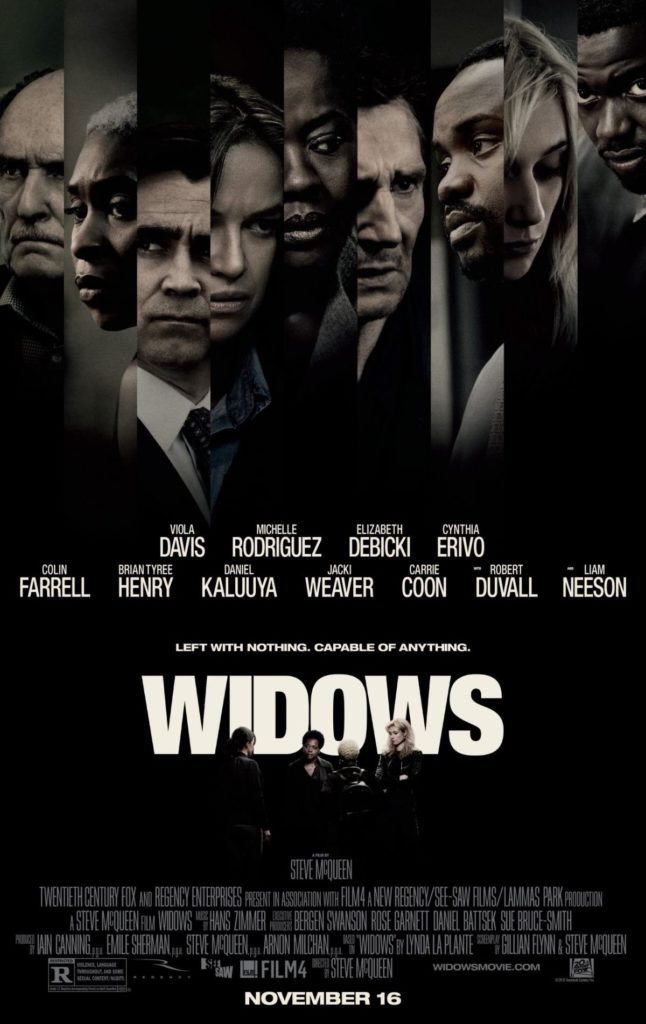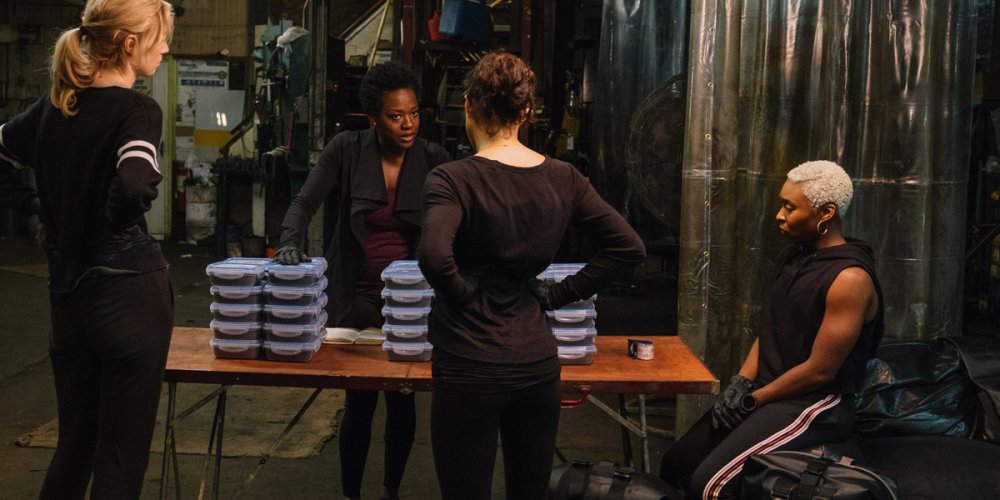Widows – Film Review

Aaron Farrell
Opening with an explosive heist botched so terribly that no one escapes alive, Widows sets its stall right away. This isn’t your glamourous amusing Heist movie or your action-packed caper of a Heist movie, its one that deals with the aftermath of those concepts, fittingly and timely, having a group of bereaving widows sort through the smithereens of their men. This is a Steve McQueen Heist movie.
Viola Davis’s Veronica is the widow charged with leading the titular bunch as her husband Harry (Liam Neeson) was the meticulous leader during his twenty-year career as a criminal. Veronica is left Harry’s notebook, containing the intricate details of the plot, apparently even down to the piss breaks. From trying to figure out the notebook’s secrets, to being held responsibile of that fatal heist which saw two million dollars of rising Black politician, Jamal Manning (Brian Tyree Henry) being burnt up, Veronica has been plunged into Chicago’s seething underworld, rife with demons and, with a slither of a chance at deliverance.
What’s prominent from the outset of Widows is that this isn’t just a film about the women thrust into crime, but very much about those men that put them there, those men that demand they stay there and, those that simply don’t care. The political narrative of Jamal fighting for his district’s Representative seat against Jack Mulligan’s (Colin Farrell) hypocritical white whiner, there through family heritage, nepotism and avarice could be a film in its own right. This is the depth given to the parallel storylines by McQueen and Gillian Flynn in their contemporary take on Lynda LaPlante’s novel. Widows can often feel like a film length version of The Wire. Having many of those aforementioned storylines reverberating a sound of their own, accumulating into cinematic music representative of sporadic, divergent lives intersecting because of class, politics, crime or happenstance.
And like The Wire, its location is as prevalent and complicit in the activities of the ensemble. Even at a run time of nearly two and a half hours, Widows does feel like it falls short of serving the many plates it attempts to spin. McQueen has given himself a lot to juggle whilst maintaining his watermarks of lingering close-ups of characters as they speak in emotional tics. Then there’s the pans and tracking shots giving life to Setting that speak volumes without the ability to talk. In one shot that tracks Mulligan’s car from a tiny rally – of Black women he’s promising the world to as the great white prophets are like to do – to his stately and secured mansion, the camera gives an indifferent view of the city, from slums to suburbia.
Another trademark of McQueen is what conversations he’s attempting to ignite. This is another aspect of Widows that is a departure from the well-worn rhetoric of the Heist movie because it endeavours to show the well-worn rhetoric of our divisive times on all the rungs it functions on. Feminism is most prominent as, time and again, the widows are used (Michelle Rodriguez’s Linda), and abused (Elizabeth Debicki’s Alice) by men whom believe they control these women in anyway that suits them. Flynn’s novels and screenplays often swim in these waters but with McQueen, there delivery is a subtler but no less sharper object. Then there’s racism, police brutality, white supremacy, corruption, and gang violence each portrayed to varying effect, but all woven into the common beats of picking a team, planning the heist, attaining the equipment and, the execution of stealing some big bucks.

For its effort to speak about many contemporary issues within the zeitgeist and deliver a grounded, harsh, and lean Heist movie, Widows might be the first Heistgeist picture. Utilising the premise as a both sword and shield for the women being forced – further, in some cases – into a lifestyle antonymic to their pursuits of surviving their varied habitats and, with the fleeting chance of thriving for the mere reason that no one expects them to.
As the film latches into its groove for a killer Third Act after a slightly bloated Second, all characters and their motives have been given their due for the audience to gestate who deserves comeuppance. This is in part due to a spectrum of sublime acting talent. Daniel Kaluuya’s Jatemme, brother and volatile enforcer to Jamal, is terrifyingly sadistic. Robert Duvall playing wretched Father to Jack and throwback to ‘the good ol’ days’ mindset. Cynthia Erivo’s Belle, who is struggling to make ends meet as a hairdresser and babysitter is ushered into the heist from sheer pragmatism on all sides. She is the strongest physical presence on the screen and yet, another example of female ingenuity over brash brawn. All of these characters are weaved together so thoughtfully that when they intersect, there is never the feeling that their disparate lives shouldn’t have tangled.
Without the addictive allure of a depraved odyssey of worth and identity in Shame or, the investigation into the heinous and often hidden history within 12 Years A Slave, Widows isn’t as unique or perhaps as equivocal as those that came before but it is still a refreshing take on formula. McQueen again proving genre doesn’t define his work but that his work can redefine genre. Sure to spark myriad conversations with its diverse themes and showcase the talents of all involved, Widows is accessible to broader audiences but no less challenging of them. And there are some killer twists that earn their reaction. Though a couple of minor beats risk gambling the import of themes for a feeling of one too many issues thrown into the fray, there’s a host of scenes that are planned, designed and executed so expertly that they steal the show.
Support our Nation today
For the price of a cup of coffee a month you can help us create an independent, not-for-profit, national news service for the people of Wales, by the people of Wales.





